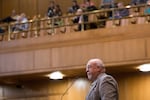On Valentine's Day, Gov. Kate Brown and Republican state Sen. Bill Hansell surveyed flood damage in Eastern Oregon from a Black Hawk helicopter.
The following Monday, the governor stopped by Hansell’s office in the state Capitol.
She wanted to discuss how the state might give financial help to flood victims in Hansell's district. Perhaps not coincidentally, Brown also had a request – one tied to a bill the Democrats want to pass this session, but which Hansell and his party vow to block.
Related: Oregon Democrats Will Hit Pause On Cap-And-Trade Bill For More Hearings
“I had begun to hear that maybe there was going to be a quid pro quo,” Hansell recalled Wednesday. “The governor was going to hold up relief work in order to try and extract a commitment from me on some of the bills or something.”
That’s not what happened. According to Hansell, Brown even told him: “I’m sure you heard rumors I’m here to do a quid pro quo. I am not.’”
But the governor did ask Hansell for something: That he call Shaun Jillions, an industry lobbyist who is among the most forceful opponents to Senate Bill 1530, the climate change bill Democrats are pushing this year.
Hansell said it only dawned on him later what Brown was actually asking. She wanted him to work with Jillions to figure out what amendments to the bill might keep Hansell from abandoning the 2020 legislative session altogether.

Men raise United States and State of Jefferson flags outside the Capitol in Salem, Ore., during a Timber Unity rally Thursday, Feb. 8, 2020. Timber Unity's signature issue is opposition to cap and trade, a plan to reduce greenhouse gas emissions, but the group attracts others like climate change deniers and State of Jefferson secessionists.
Bradley W. Parks / OPB
The odd meeting is a fitting example of the state of affairs in the Capitol, as Democrats and Republicans once again brace for a clash on climate change. With the cap-and-trade bill headed to a potential Senate vote next week, Republicans are showing more certainty than ever that they will stage the walkout that has long loomed over the session. Democrats are trying to keep them in the building.
Related: Oregon House Republicans A No-Show At Evening Session
The governor has been busy trying to connect with Senate Republicans to identify incentives. That’s included reports of carving out extra money for a veteran’s hospital in Roseburg or funneling more dollars to a community college.
The attempted deal-making is a matter of arithmetic. Democrats need at least two Republicans on hand in the Senate to achieve a 20-member quorum, allowing them to conduct business.
But so far, it hasn’t seemed to work.
Republican Leader Herman Baertschiger Jr., R-Grants Pass, said his caucus is “solid” and united against the cap-and-trade bill. For the past week, Republican Senators have been reading proclamations on the Senate floor from rural counties urging them to ensure the bill doesn’t pass.
Baertschiger said the governor has “offered everybody something.”
“It stinks. I won’t have no part of it, and it’s soft corruption,” he said.

State Sens. Dennis Linthicum, R-Klamath Falls, and Herman Baertschiger Jr., R-Grants Pass, talk on the Senate floor at the Capitol in Salem, Ore., Thursday, April 11, 2019.
Bradley W. Parks / OPB
Brown sees it differently.
“The governor is trying to speak to individual members about the things we all want for their districts. Wildfire funding can’t practically happen without a quorum,” said Nik Blosser, the governor's chief of staff. “There are things that are specific to districts, and that’s more how we are seeing the conversations. We can’t do these things if we don’t have a quorum.”
It’s not clear all Republicans are as ready to walk out as Baertschiger.
Of 10 GOP senators interviewed by OPB in the last week, seven said they would walk away from the session if SB 1530 doesn’t include a referral to voters or other substantial changes. Three more — Sens. Denyc Boles, Lynn Findley, and Tim Knopp — would not say whether they were prepared to leave. Sen. Dennis Linthicum, R-Klamath Falls, said he was too busy to speak to OPB. Sen. Alan Olsen, R-Canby, is away from the Capitol.
If Republicans do stage a walkout, it could come next week. SB 1530 is currently expected to receive a vote in the Legislature's budget committee on Monday, the last step before the full Senate. That's as far as many GOP senators are comfortable allowing the bill to proceed.

State Rep. Lynn Findley, R-Vale, introduces legislation on the House floor as the public gallery looks on at the Capitol in Salem, Ore., Tuesday, April 2, 2019.
Bradley W. Parks / OPB
During the 2019 legislative session, Senate Republicans left the Capitol two different times. With a walkout in June, they helped kill an earlier version of the climate change bill they are currently protesting.
But last year’s walkouts were a surprise, catching many off guard; this year, a Republican exodus feels more like a foregone conclusion.
Republicans have even considered branding for a walkout this time around. According to Sen. Brian Boquist, R-Dallas, they’d pitch it as a “boycott for referral,” a reference to their insistence the policy change require voter approval.
They have also picked up a few tips from their previous departures.
Sen. Chuck Thomsen, R-Hood River, said that during the 2019 walkout, when the state police were on the hunt for Republican lawmakers, they stopped by Thomsen’s pear orchards. They spoke to his wife and the foreman.
This time, even Thomsen’s wife doesn’t want to know where he’s headed. And, he said, he won’t tell her.
He’s had his bag packed for weeks and has already bought a plane ticket. It’s on Southwest Airlines, he said, so it’s easy to change the dates.
Thomsen will say this for certain: this time, he’s not headed to Idaho. It’s too cold this time of year. His suitcase is full of polo shirts and shorts.
Boquist said Thursday he wouldn’t hesitate to head back across the state’s eastern border once again. He has friends near Lewiston.
“Best steelhead fishing in the country,” Boquist said. “I found a coffee shop that has wi-fi. I'll go there and continue to do Senate work.”
Sen. Dallas Heard, R-Roseburg, said he shed 15 pounds during last year’s protest because of stress. For the past couple of weeks, he joked, he’s been doing “cheeseburger lifts” moving them from the plate to his mouth.
“I’ve given it a lot of thought,” Heard said on a more serious note. “The walkout is not something I want to do. The majority has full control.”

State Sen. Kim Thatcher, R-Keizer, waits for the start of Oregon Gov. Kate Brown's inaugural address at the state Capitol in Salem, Ore., Monday, Jan. 14, 2019.
Bradley W. Parks / OPB
Sen. Kim Thatcher, R-Keizer, who has served 15 years in the state Legislature, said she sees this as the most “damaging” legislation she’s faced as a lawmaker.
“Some people see it as shirking our duties, but I see it as actually doing everything we can for our constituents,” Thatcher said of possibly leaving Salem.
Under SB 1530, greenhouse gas emissions allowed in Oregon would be capped, and that cap would be reduced over time. Polluters in the transportation, utility and manufacturing sectors would have to obtain state-issued credits for each metric ton of carbon dioxide they emit.
The bill has spurred intractable disagreement — even among lawmakers who agree that climate change is an issue state government must address.
Democrats believe a cap-and-trade program would help the state transition away from fossil fuels, setting a course that would make Oregon a green energy leader and providing a blueprint for other small or medium-sized states.
Republicans point out that Oregon’s emissions are tiny on a global scale. They worry that the new regulations will increase prices, hurting families and spurring businesses to flee the state.